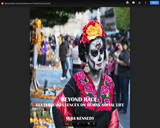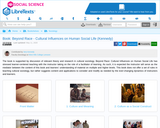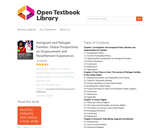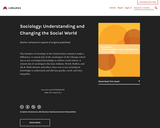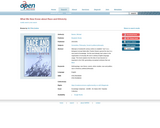The book is supported by discussion of relevant theory and research in cultural sociology. Beyond Race: Cultural Influences on Human Social Life has stressed learner-centered teaching with the instructor taking on the role of a facilitator of learning. As such, it is expected the instructor will serve as the mediator between the content of this book and learners’ understanding of material on multiple and higher levels. This book does not offer a set of rules in teaching cultural sociology, but rather suggests content and applications to consider and modify as needed by the ever-changing dynamics of instructors and learners.
1: Culture and Meaning
Culture is an expression of our lives. It molds our identity and connection to the social world. Whether it is our values, beliefs, norms, language, or everyday artifacts each element of culture reflects who we are and influences our position in society. If you think about how we live, communicate, think and act, these parts of our existence develop from the values, beliefs, and norms we learn from others, the language and symbols we understand, and the artifacts or materials we use.
1.1: Link Between Culture and Society
1.2: Defining Culture
1.3: Cultural Sociology
1.4: Theoretical Perspectives on Culture
1.S: Culture and Meaning (Summary)
2: Culture as a Social Construct
Because culture is a socially meaningful expression that can be articulated and shared it often takes a physical form in our minds. A spiritual or philosophical expression that is not physical in nature becomes tangible in our minds and is equivalent to an “object”. The cultural expression is so real that people perceive it as something achievable or concrete. The mental picture is the object and the meaning associated with the object is the expression when we speak about non-material culture.
2.1: Social Production of Culture
2.2: Collective Culture
2.3: Group and Organizational Culture
2.4: Levels of Culture
2.S: Culture as a Social Construct (Summary)
3: Cultural Power
All humans are comprised of the same biological structure and matter. The unique distinctions among us stem from our culture. The differences in our values, beliefs, norms, expressive language, practices, and artifacts is which stands us apart from each other. Being culturally unique projects exclusivity that draws attention to our variations and differences. People find cultural fit or acceptance from those who share uniqueness or the same cultural characteristics.
3.1: Cultural Hierarchies
3.2: Social and Cultural Capital
3.3: Cultural Hegemoney
3.4: Prejudice and Discrimination
3.S: Cultural Power (Summary)
4: Cultural Identity
Trying to figure out who you are, what you value and believe, and why you think the way you do is a lifelong process. Try to capture the core of your being by describing who you are. Once you have formulated a description of yourself, evaluate what you wrote. Does your description focus on your personal characteristics or your cultural characteristics you learned from other people in your life (i.e., family, friends, congregation, teachers, community, etc.)?
4.1: Identitiy Formation
4.2: Identity Labels and Categories
4.3: Geographic Region
4.4: Race and Ethnicity
4.5: Social Class
4.S: Cultural Identity (Summary)
5: The Multicultural World
Everyday production of culture centers on local and global influences (Giddens 1991). With the advancements in technology and communications, people are experiencing greater social forces in the construction of their cultural reality and identity. The boundaries of locality have expanded to global and virtual contexts that create complexities in understanding the creation, socialization, adaptation, and sustainability of culture.
5.1: Globalization and Identity
5.2: Culture Today
5.3: Building Cultural Intellegence
5.S: The Multicultural World (Summary)
